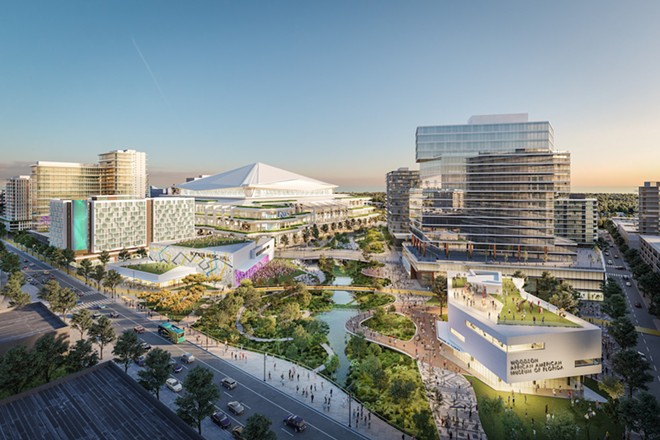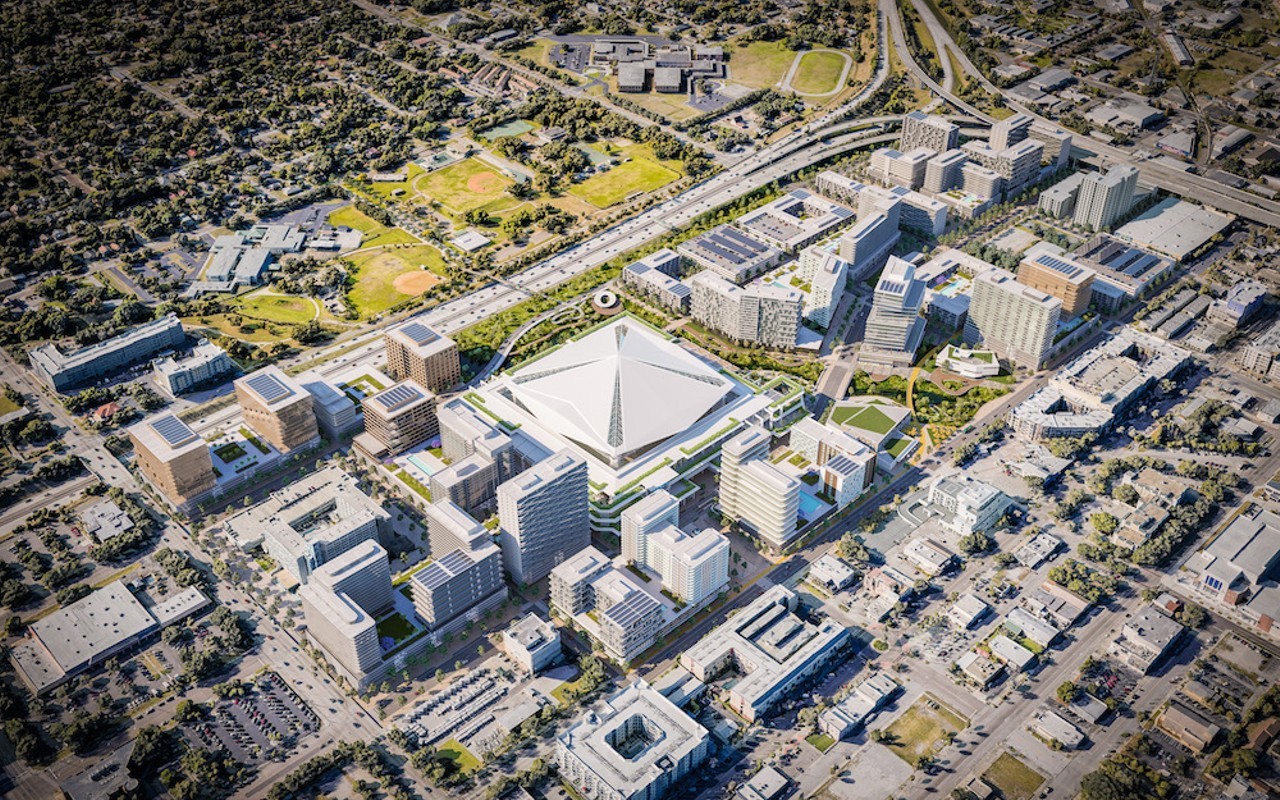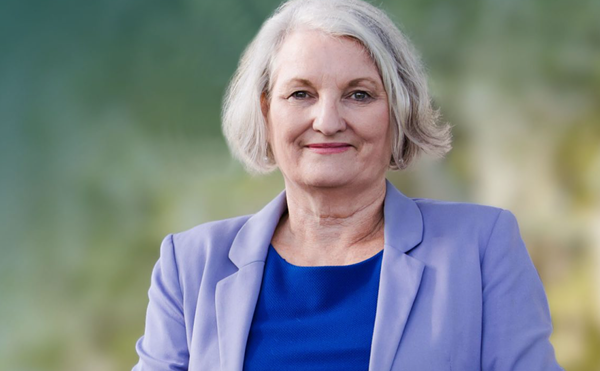Let's rewind to the city's baseball odyssey. In 1988, St. Pete shelled out $138 million for a stadium, only to spend the next decade twiddling its thumbs until the Tampa Bay Rays decided to call it home. During the many quiet years that followed, the team attendance struggled to climb out of the bottom ranks of MLB, and the stadium remained an uneventful cornerstone of the city. The only beneficiary was Ferg’s bar.
Fast forward to the 21st century, and suddenly, the cityscape around the stadium is flourishing. But surprise! It has nothing to do with the Rays. The Dali Museum and the James Museum that have become cultural magnets, a new pier emerged, and restaurants dotted the downtown and Central Ave. And people from the north discovered they could live in a great walkable city, work from home, enjoy the sunshine and the beaches and pay no state income taxes. The Rays were mere spectators in this urban renaissance. Ask anyone what they love about St. Petersburg. The Rays don’t make it into the starting line-up.
And guess who steps up to the plate? St. Petersburg, ready to swing for the fences. The city proposes not only to build the Rays a shiny new $1.2 billion stadium by committing $700 million including interest, forgiving $400 million in taxes, but it’s also ready to hand over valuable land for $500 million under value. The Rays hit the $1.6 billion jackpot.
Now, it's up to the St. Petersburg City Council to decide whether they will be heroes or chumps. Council members talk about fiscal responsibility, and the needs like storm-water hardening are looming large. Then there’s the city's ability to borrow in emergencies, particularly in the face of potential natural disasters like hurricanes if they tap their credit card to build a stadium.
A $1.6 billion saving could be a transformative force in addressing the city's housing crisis. Allocating just part of these funds to a $250 million Housing Assistance program could result in the construction of thousands of units of affordable housing, as well as creating employment opportunities for construction workers. And consider the potential impact of directing some of these funds towards initiatives that truly uplift the community, such as scholarships for underprivileged youth.
The proposed deal seems like a fiscal freefall. Will Council Members do the right thing?
Some council members, proudly donning the label of fiscal conservatives, expressed concerns about the financial implications of such a grandiose giveaway. They emphasized the need to treat the city's money like his own and prioritized prudence. However, in a perplexing turn of events, one these same council members seemingly threw caution to the wind when they interjected with a bewildering, "but do you know how hard it was to get baseball?" and another with “we have to keep baseball.” It's a head-scratcher – the city's historical struggle to attract a baseball team should not overshadow the current responsibility to safeguard taxpayers' dollars.
It's time for the St. Petersburg City Council to show some backbone and tell the Rays if you want in on this deal, pay your fair share. The stark reality is that the Tampa Bay Rays are a private business owned by billionaires with exorbitant salaries paid to players and management. Should we, the hardworking residents, foot the bill for a shiny new stadium that they could well afford themselves? Why should we subsidize their success?
The city council must resist getting entangled in a web of sentimentality about baseball and decide if they'll stick to their principles or buckle under the pressure of billionaire sports owners. Council Members should be having open forums with their constituents, provide the facts, and get their opinions, especially since polls show more than 75% oppose the deal. And while the emotional attachment to baseball may tug at heartstrings, prioritizing community needs over a sports spectacle is a testament to responsible governance and a genuine commitment to the well-being of all residents.
We like baseball, but will the council heed the call of their fiduciary responsibility or become mere pawns in the Rays' game of real estate roulette? They need to slow down and get the facts.
Ron Diner is a member of No Home Run, which represents a group of committed Pinellas County citizens challenging the current Rays Hines stadium proposal.
Subscribe to Creative Loafing newsletters.
Follow us: Apple News | Google News | NewsBreak | Reddit | Instagram | Facebook | Twitter | Or sign up for our RSS Feed



![Tampa Bay Rays unveil plans for $1.3 billion St. Pete stadium, deal still awaits approval from local leaders [Photos]](https://media2.cltampa.com/cltampa/imager/tampa-bay-rays-unveil-plans-for-13-billion-st-pete-stadium-deal-still-awaits-approval-from-local-leaders-photos/u/inlineslideshow/16374126/hines_tropicana_view02_112922.jpg?cb=1695140926)
![Tampa Bay Rays unveil plans for $1.3 billion St. Pete stadium, deal still awaits approval from local leaders [Photos]](https://media1.cltampa.com/cltampa/imager/tampa-bay-rays-unveil-plans-for-13-billion-st-pete-stadium-deal-still-awaits-approval-from-local-leaders-photos/u/slideshowthumb/16374125/hines_tropicana_view01_112922.jpg?cb=1695141135)
![Tampa Bay Rays unveil plans for $1.3 billion St. Pete stadium, deal still awaits approval from local leaders [Photos]](https://media2.cltampa.com/cltampa/imager/tampa-bay-rays-unveil-plans-for-13-billion-st-pete-stadium-deal-still-awaits-approval-from-local-leaders-photos/u/slideshowthumb/16374126/hines_tropicana_view02_112922.jpg?cb=1695140926)
![Tampa Bay Rays unveil plans for $1.3 billion St. Pete stadium, deal still awaits approval from local leaders [Photos]](https://media2.cltampa.com/cltampa/imager/tampa-bay-rays-unveil-plans-for-13-billion-st-pete-stadium-deal-still-awaits-approval-from-local-leaders-photos/u/slideshowthumb/16374127/hines_tropicana_view03_112922.jpg?cb=1695141135)
![Tampa Bay Rays unveil plans for $1.3 billion St. Pete stadium, deal still awaits approval from local leaders [Photos]](https://media1.cltampa.com/cltampa/imager/tampa-bay-rays-unveil-plans-for-13-billion-st-pete-stadium-deal-still-awaits-approval-from-local-leaders-photos/u/slideshowthumb/16374128/hines_tropicana_view04_112922.jpg?cb=1695141135)
![Tampa Bay Rays unveil plans for $1.3 billion St. Pete stadium, deal still awaits approval from local leaders [Photos]](https://media1.cltampa.com/cltampa/imager/tampa-bay-rays-unveil-plans-for-13-billion-st-pete-stadium-deal-still-awaits-approval-from-local-leaders-photos/u/slideshowthumb/16374129/hines_tropicana_view05_112922.jpg?cb=1695141135)















